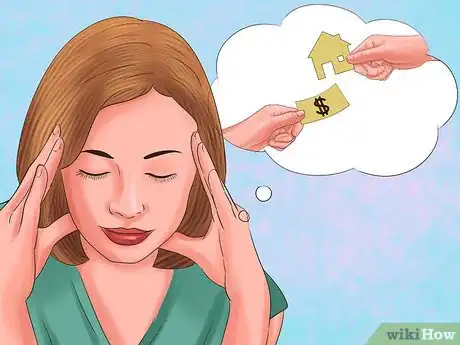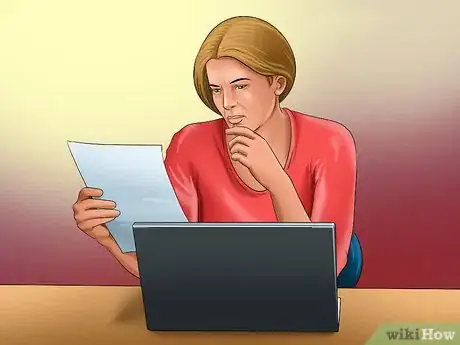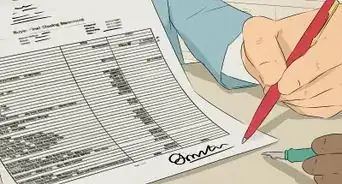This article was co-authored by Carla Toebe. Carla Toebe is a licensed Real Estate Broker in Richland, Washington. She has been an active real estate broker since 2005, and founded the real estate agency CT Realty LLC in 2013. She graduated from Washington State University with a BA in Business Administration and Management Information Systems.
This article has been viewed 11,740 times.
Purchasing a bank-owned home can be a risky investment because these homes have often not been maintained properly by homeowners. They are often "foreclosed homes" (situations where the homeowner was no longer able to make mortgage payments so the bank took ownership of the house) and can be in almost any condition. You can find bank-owned homes at auctions, through Realtors, and on realty websites, and knowing how to go about buying one can help you get a house for a great price.
Steps
Finding a Bank Owned Property
-
1Determine what you're looking for. If you're looking for a bank-owned home, you are probably not hung up on the condition of the home--but you are certainly looking for other things. Make a list of requirements you have for your foreclosure, such as location, price range, how bad the condition is, type of home, and so on.
- It is important to come up with this list prior to finding a real estate agent so that you can hand them your requirements right away. This will help them find properties that meet your needs.
-
2Ask a real estate agent specialist. Finding bank-owned properties isn’t as easy as it is to find a traditional home. Some listings charge a fee for access, and while there are some free listing sites, the listings are much better on paid sites. Finding an expert real estate agent who knows the foreclosure game can help you find houses you never would have on your own.Advertisement
-
3Attend a public auction. Many bank-owned homes are sold during auctions. Two types of auctions are available: public foreclosure auctions, and public auctions. In order to get to the public auction stage, the house passes first through the foreclosure auction right after liquidation. If it doesn’t sell there, it is turned over to an agent. If an agent can’t sell it, it is given to an auction company.[1]
- Auctions usually take place quickly and before you have had time to inspect the home.
- Some also require that you pay in cash.
-
4Look on bank and government websites. You can find foreclosed homes on the market by doing a simple internet search with the terms “REO properties” or “foreclosures.” The results will reveal listings on both government and bank websites.[2]
-
5Use real estate websites. You can also find foreclosed homes on traditional real estate websites, but these homes are in the hands of real estate agents. If you go after one of these homes, you will have to deal with the agent instead of directly with the bank.
- Popular sites that have real estate listings include Zillow and Redfin.
Getting Ready to Make an Offer
-
1Get preapproved for a mortgage. if you are serious about buying a bank-owned home, consider getting preapproved for a mortgage loan from the bank. You can’t truly consider a home unless you know how much you have available for spending. Do a little planning to make sure your credit score is high before you apply.
- When you go apply for a mortgage loan, you need to have documents in hand like proof of income and assets, employment verification, and identity documentation.[3]
-
2Hire a real estate agent. Real estate agents who have experience selling foreclosed homes are the best ones to consider hiring for your house hunt. Your real estate agent can negotiate with the bank so that you are saved this hassle, as well as find homes that you don’t have access to as a consumer. The real estate agent will also present your offer to the bank.[4]
- In the foreclosure market, your real estate agent does not have to contract with other buyers' agents in order to look at the home. This means that your agent can show you multiple homes at the same time.
-
3Get a home inspection. Before making an offer on a house, get the property inspected and appraised so that you know you are getting the best value for your price, and so that you know what risks you are taking by procuring this house. The benefit to house hunting amongst foreclosures is that you don’t have to have a bid on the house before making an inspection.[5]
- Home inspections can also help you determine the estimated cost of repairs and the condition of the house.[6]
-
4Do your homework. Look around in the neighborhood of the foreclosure you have your eye on to determine what price range the house would be in if it were not foreclosed. Make sure that your offer is comparable to these other values. Look up recent sales in the neighborhood on realty websites (or ask your agent) to determine these prices.[7]
-
5Protect yourself when you make the offer. Ask your agent for advice about how to protect your offer. They may be able to recommend a contract that has contingencies in case you wish to back out at any point in the offer process.[8]
-
6Make an offer. Finally, after you have prepared for it, make the actual offer. The price that the house was listed for is most likely set at market value, so you won’t get much wiggle room with the asking price. Work with your agent to determine the best price based on the prices of recently sold homes in the area, as well as your own finance option.
- Tell your agent what price you want and they will make the offer to the bank.
EXPERT TIPCarla Toebe is a licensed Real Estate Broker in Richland, Washington. She has been an active real estate broker since 2005, and founded the real estate agency CT Realty LLC in 2013. She graduated from Washington State University with a BA in Business Administration and Management Information Systems.Real Estate Broker
 Carla Toebe
Carla Toebe
Real Estate BrokerYou can try to negotiate, but be aware of the risks. Real estate broker Carle Toebe explains, “In most circumstances, the bank will get multiple offers, so it is always a good idea to put your best offer out first. If you’re willing to risk losing the property and don’t think there are multiple offers, then go ahead and negotiate.”
-
7Anticipate a counter offer. Even though you have done your research and come up with what you believe is a fair price, you will likely be issued a counter offer as the bank searches for the best price it can get. Don't be surprised by a counter offer that is not satisfactory. Make another offer in return if you don't like it.
- The bank may not want to negotiate on price since it is usually set at market value, but you may ask for a lower interest rate or lower closing costs.
- Banks typically counter any offers under list price, but you can still get an offer accepted under market value by negotiating.
Closing the Deal
-
1Get a title search. Although a bank-owned home generally has a clear title, you should never assume this is the case. Search public records or ask your agent to help you find liens or owed taxes on the property you are interested in.[9]
- Hire a title company to run the title search, making sure that it is a full and insured search, to be certain that there will be no financial snafus when you close the deal.
- Make sure the bank pays for the final utilities and any code enforcement fines that are not recorded as liens, as well.
-
2Be ready to wait. Be prepared to wait weeks or even months for the negotiation dust to settle. Banks usually shop around for the best price they can get on a foreclosed property, so they may hold out for another buyer if your offer is too low.[10]
-
3Get your financing ready. Once a bank agrees on your price and will sell the house to you, get a hold of your real estate agent and lender to obtain the money you need to pay for the house. In your appeal for cash, you should include estimates on renovations, escrow, closing costs, excise tax, and any other costs you foresee.
- Closing costs vary with each home purchase, but can include a credit report fee, a fee for processing your loan, attorney fees, inspection charges, title insurance, and many more.[11]
- If you are getting financing, the lender will prepare an estimate of the closing costs. If you pay cash, the real estate agent can prepare the estimate.
-
4Get the keys when the deal closes. After your offer is accepted, the deal can officially be closed. Generally your real estate agent will obtain the keys and give them to you when you sign the final papers for the house.
- When you buy a home, just as when you buy a car, you actually have the title signed over to you. This is part of the process once your offer is accepted. This is also the time you agree to pay closing costs.
Expert Q&A
-
QuestionDo bank-owned homes pay closing costs?
 Carla ToebeCarla Toebe is a licensed Real Estate Broker in Richland, Washington. She has been an active real estate broker since 2005, and founded the real estate agency CT Realty LLC in 2013. She graduated from Washington State University with a BA in Business Administration and Management Information Systems.
Carla ToebeCarla Toebe is a licensed Real Estate Broker in Richland, Washington. She has been an active real estate broker since 2005, and founded the real estate agency CT Realty LLC in 2013. She graduated from Washington State University with a BA in Business Administration and Management Information Systems.
Real Estate Broker Sometimes they do. If you need the closing costs paid, then ask for them. If they say no, then you will have to move on.
Sometimes they do. If you need the closing costs paid, then ask for them. If they say no, then you will have to move on. -
QuestionDo you have to have cash to buy a foreclosed home?
 Carla ToebeCarla Toebe is a licensed Real Estate Broker in Richland, Washington. She has been an active real estate broker since 2005, and founded the real estate agency CT Realty LLC in 2013. She graduated from Washington State University with a BA in Business Administration and Management Information Systems.
Carla ToebeCarla Toebe is a licensed Real Estate Broker in Richland, Washington. She has been an active real estate broker since 2005, and founded the real estate agency CT Realty LLC in 2013. She graduated from Washington State University with a BA in Business Administration and Management Information Systems.
Real Estate Broker Usually, you will be able to finance a foreclosed property but check with your lender to make sure they will loan you the money for the property. Not all homes are fundable with the type of loan you might be trying to purchase it with. Don't try to hide the issues of the home from the lender. Disclose it before you even make the offer so that there are no surprises later. The underwriter can put a hard stop to the purchase if certain repairs are not made and often the seller will not make them.
Usually, you will be able to finance a foreclosed property but check with your lender to make sure they will loan you the money for the property. Not all homes are fundable with the type of loan you might be trying to purchase it with. Don't try to hide the issues of the home from the lender. Disclose it before you even make the offer so that there are no surprises later. The underwriter can put a hard stop to the purchase if certain repairs are not made and often the seller will not make them. -
QuestionCan you negotiate with the bank who owns a foreclosed home?
 Carla ToebeCarla Toebe is a licensed Real Estate Broker in Richland, Washington. She has been an active real estate broker since 2005, and founded the real estate agency CT Realty LLC in 2013. She graduated from Washington State University with a BA in Business Administration and Management Information Systems.
Carla ToebeCarla Toebe is a licensed Real Estate Broker in Richland, Washington. She has been an active real estate broker since 2005, and founded the real estate agency CT Realty LLC in 2013. She graduated from Washington State University with a BA in Business Administration and Management Information Systems.
Real Estate Broker In most circumstances, the bank will get multiple offers so it is always a good idea to put your best offer out first. Rarely will a bank counter the offer but some do. Check what the markets are like and how short the inventory is to make your decision. If you are buying a HUD property and they don't get their minimum bid, then they will tell you what they want. Some will counter if the highest offer is not good enough for them or if they want to get more. It really depends on how badly you want that specific property. If you are okay to lose it, then go ahead and negotiate unless you know there are multiple offers. If there are multiple offers, provide the very best offer you are willing to pay for the property.
In most circumstances, the bank will get multiple offers so it is always a good idea to put your best offer out first. Rarely will a bank counter the offer but some do. Check what the markets are like and how short the inventory is to make your decision. If you are buying a HUD property and they don't get their minimum bid, then they will tell you what they want. Some will counter if the highest offer is not good enough for them or if they want to get more. It really depends on how badly you want that specific property. If you are okay to lose it, then go ahead and negotiate unless you know there are multiple offers. If there are multiple offers, provide the very best offer you are willing to pay for the property.
Warnings
- Be careful attending auctions. Homes that cannot be first inspected have a likelihood of needing extensive repair.⧼thumbs_response⧽
References
- ↑ http://foreclosures.bankofamerica.com/how_to_buy_a_foreclosed_home
- ↑ http://foreclosures.bankofamerica.com/how_to_buy_a_foreclosed_home
- ↑ http://www.investopedia.com/financial-edge/0411/5-things-you-need-to-be-pre-approved-for-a-mortgage.aspx
- ↑ https://www.redfin.com/guides/how-to-buy-a-foreclosed-home
- ↑ http://www.realtor.com/advice/top-4-reasons-buy-bank-owned-property/
- ↑ http://foreclosures.bankofamerica.com/how_to_buy_a_foreclosed_home
- ↑ http://www.zillow.com/foreclosures/buyer/buying-a-bank-owned-property/
- ↑ https://www.redfin.com/guides/how-to-buy-a-foreclosed-home
- ↑ http://www.zillow.com/foreclosures/buyer/buying-a-bank-owned-property/


































































